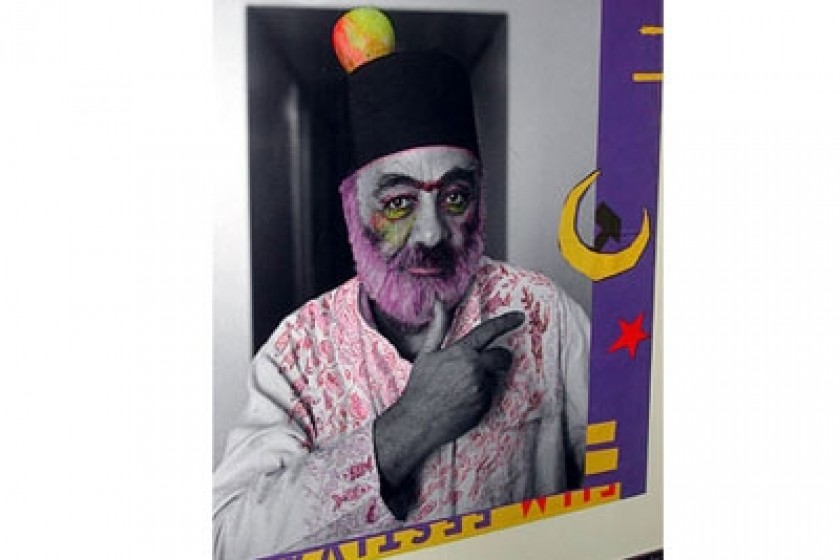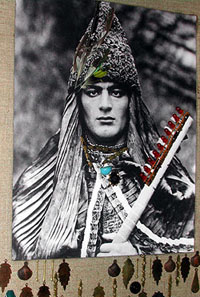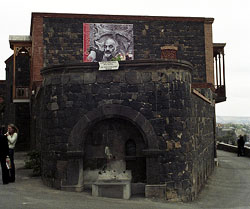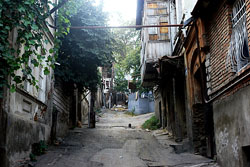
Good Can Overwhelm Evil
The Armenian Parajanov made a movie based on a tale of Azeri, a nation that is historically considered to be an enemy to Armenians.
Khachatryan says that the film " Ashik-Kerib " was shot during the events in Sumgait (a town in Azerbaijan , where in February of 1988 the Armenian community was slaughtered or driven away, which was one of the origins of the Karabagh conflict). She says that when Parajanov went to Baku , the Armenians didn't understand his step. "They spoke about it only 10 years after his death," Khachatryan says.
Yavuryan was the cameraman on that film. He says that after Sumgait it was impossible to talk about the Azeri script and movie in Armenia , and Parajanov was very nervous and under pressure. Nevertheless, Parajanov didn't let the world lose another masterpiece.
After having shot the video material, there was an option to record the dialogue not in the Azeri language, but in Farsi. Yavuryan says lots of people suggested this to Parajanov. "But he really was the child of the great Caucasian culture, where Christian and Muslim, worldly and spiritual are tightly intertwined and mixed. He adored this culture," Yavuryan says.
 |
|
Yuri Mgojan-Parajanov's neighbor was shoot in "Ashik-Kerib"
|
Parajanov decided to hire an Azeri composer and singer for the film. According to Yavuryan, Parajanov said: "If they (in Baku ) hang me in the same place with Shahumyan , let it be. I have to go." (Stepan Shahumyan, an Armenian,was one of the so-called 26 Baku Communist Commissars, who was executed in Baku in 1918.)
"And he went to Baku in January 1989 (as the conflict intensified) to record the soundtrack."
Yavuryan says if he had recorded it in another language it would have failed. He remembers what Parajanov said in one interview in Germany : "I shot Ashik-Kerib. And I can die."
Sargsyan says that during that period nothing serious happened in Armenia against Parajanov, but that some Armenians kept saying that it was impossible for an Armenian to touch a Muslim story after the Sumgait events.
He adds: " Parajanov used to say, 'Only good can overwhelm the evil.'"
The Confession: "It Turned Out He Was Alone"
Parajanov actually started to shoot "The Confession."
Chiaureli says there were only three days of work. Then Parajanov's health got worse.
Chiaureli says that generally people stayed with him and he never was alone. She says she doesn't remember him ever just sitting quietly. "He always appeared at our place after 3 am ."
"When he got worse, he went to Moscow . They operated and found cancer, and took out one of his lungs. Then he moved to Tbilisi and was kept for a period in a hospital. When he came out from there, he started to collect for a museum. He spread it out over three rooms (using his sister's rooms as well), including the yard and balcony."
Then Parajanov was transported to Yerevan.
Manana Chkonia, the head of a fund devoted to Parajanov's works, said it turned out that in Georgia no one needed him when he was very sick: "There was a negligence toward him in Georgia at that time."
Chkheidze says there were some persons who visited him, brought him meals, and took care of him. According to Shcherbatjuk, in Tbilisi there wasn't any person who would take care of him. She says: "You know, his house was always full with guests, but when he got sick and needed care every minute, it turned out that he was alone."
Shcherbatjuk says she couldn't take care of him when he got very sick, not because of being divorced from him, but because her father was very sick as well and she couldn't leave him alone.
Yavuryan tells this story: "In New York we had $15 for both of us. It was the Soviet period; it was usual for us on trips abroad to receive from the state such a miserable amount of money. In New York he was offered to perform in a Broadway show for two weeks, for a contract worth thousands of dollars. And he said: 'Alik, let's go away immediately. Tbilisi is the dearest place for me. It doesn't matter if I don't have money: In any case, I would give the money away."
Chiaureli says that Parajanov had a dream to die and be buried in Tbilsi: "But he was only born in Tbilisi , and not buried."
Parajanov was taken to friends in Yerevan , then to a hospital in Paris . When Parajanov was dying, he was transported to Yerevan , where he died and is buried.
"Stay And Live Here In Peace"
"There was a tragedy," Chiaureli says. "His son sold his house for $3000. I called him and Svetlana and asked them not to do this, but it happened."
Givi Jibladze, who had been their neighbor since 1967, says he bought the empty house from Parajanov's son, Suren.
Shcherbatjuk says: "I don't blame my son for selling the house. But in a documentary made by Russian filmmakers, I said (and I hope my son didn't see this film), 'Let God forgive my son for selling the house.'''
According to Suren Parajanov, " Houses were ruined here in Georgia at that time. The big hotels were full of refugees from Abkhazia. And our house was empty. They might take the empty house, and they might not. I am not a rich man able to grant the house to Georgia , or to make a museum myself."
Suren Parajanov tells a story, which maybe is one more legend surrounding Parajanov and those around him.
Suren says that he has never believed in fortune-tellers, but in 1995 his friend took him to one in Kiev . She looked at Suren and asked if he was selling a big summer house. Suren answered: no, nothing. She wasn't satisfied and repeated her question twice more. Finally he said that he wanted to sell a small house in Tbilisi and he couldn't manage to fulfill all necessary documentation for that. The fortune-teller said to him: 'Tonight you will get a call from Tbilisi : everything is ready.'
"And I got a call that night: everything really was ready," Suren Parajanov said.
Shcherbatjuk says she had no right to sell the house because she was divorced from Parajanov, and the only heir was Suren, his son. She says that Chiaureli did call her, and that she told Chiaureli that concerning the house they should talk only with Parajanov's son. "I respect Sophiko very much," Shcherbatjuk said. "We have a good relationship, but she didn't talk to Suren. She knew that it was a matter of money."
She says that for five years (1990-95), no one in Tbilisi was interested in that house. "If they wanted to make a museum, why didn't they do something before the house was sold? And only when my son wanted to sell the house did everybody here made a fuss. And that was it. Not any concrete steps! But I don't blame anyone," Shcherbatjuk says, because she knows those years were a very tough time for Georgia .
"And after all," she says, "it wasn't only Suren's decision. After his surgery, Parajanov said that the house should be sold. He even mentioned the probable price for it."
Chiaureli says the house was sold when they all had nothing and were not able to do anything: "Imagine, in Georgian Cinematographs' Union we were not able to gather that $3000 to buy the house and make a museum."
(Suren Parajanov says he sold the house for $6000.)
 |
| Parajanov's Museum in Yerevan |
Shcherbatjuk points out that Armenians built a house in Yerevan to honor him despite similar difficult conditions. Armenia was suffering an economic blockade due to its support for the breakaway Karabagh region in its conflict with Azerbaijan .
Shcherbatjuk says that when she visited Parajanov in a Moscow hospital, he said, " Can you imagine, Armenians have built a house for me."
Suren Parajanov says that his father wanted to sell the house in Tbilisi and move to the Yerevan house, but it was not completed in time.
Sherbatjuk says: "It's a pity he didn't live there. He could have organized his own museum, which he started to do in Tbilsi. But his Tbilisi flat was already too small for the huge amount of his works."
Shcherbatjuk says that the house in Tbilsi was in very bad condition. Even when Parajanov was still alive, several times the ceiling fell down and once it broke an antique vase. Moreover, she says it got worse after being left uninhabited for five years after his death. "Now the house looks nice after the new owners renovated and rebuilt it to live in. So if here in Tbilisi they wanted to make a museum in that house, it would still take lots of investment," Shcherbatjuk says.
Shcherbatjuk says the family that bought Parajanov's house were his neighbors. The Jibladzes suggested they would sell the house back if someone wants to make a museum. "I asked them if they live happily and safely there. They said, 'Yes.' I said: 'Stay and live here in peace.'"
 |
|
Parajanov's friends used to go to his Tbilisi house from side street, not from Kote Meskhi
|
She says that she went to the house and specially didn't go in from the side street all his friends and guests used when he was alive, but instead used the main entrance. " I knew that the house was significantly changed on the side which was the charm of the house -- the veranda. They closed it up with bricks. And the house has lost its charm. The view from that balcony was amazingly beautiful, especially at night. His childhood and youth were spent there. From prison he wrote me about that balcony."
She also said the new owners told her that Armenians have stolen all the stuff. "I said to them: 'Don't use that word. And I told them how it was.'"
To be continued.
Arevhat Grigoryan
 Videos
Videos Photos
Photos
Write a comment